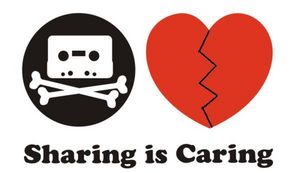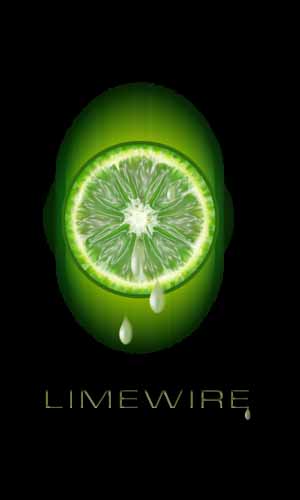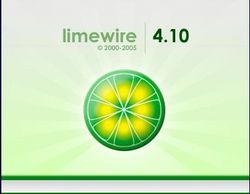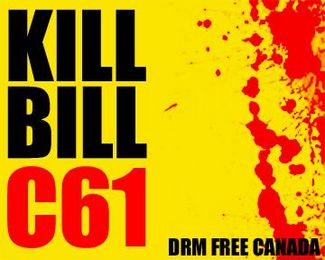F08 CPSC203 T08 GROUP 2
Contents
Group Members:
- Christopher Belisle
- Lily Hoang
- Anjali Mehta
- Daniel Reydler
- Xiaoqian Wang
Initial Project Statement:
Current technology in focus:
Limewire is a file sharing program that are used by millions
Issues presented with this technology:
We will be focusing on two issues.
Security:
Limewire, is one of the most popular methods used to download music by many individuals. However, majority of the time, you are clueless of whom your source is, which may lead to potential threats to your computer. Such as, obtaining private information from your computer. Although, your source may be anonymous, there is yet another potential problem that exists, the file itself. The file could potentially contain a virus itself, or be corrupted. These are certain things things that are traded off in order to obtain your music.
Contribution to the Pirated Industry:
Although, Limewire makes music easily acessible to obtain. It also contributes to the pirated industry of obtaining material. Since Limewire is a file sharing program, accessible to many, it is difficult to know where your material is obtained from. Using this technology as an example, we will explore the issues that revolve around fast file sharing programs such as Limewire, and its effect on the music industry.
Background Information:
Limewire was founded in 2000 by CEO Mark Gorton. It allows millions of users world wide to share files with one another for music, software, photos, and other documents. Limewire comes available as LimeWire Basic, which is free to users, and LimeWire PRO, which users must pay for.
Peer-to-Peer(P2P) File Sharing
P2P File sharing involves the sharing and transferring of documents and files. Using P2P client software, an individual can advertise, send and receive information from other individuals.This file sharing is limited to a circle of computer users that an individual knows and is willing to share with. One of the main models of P2P sharing is the decentralized model, which is used by Gnutella, and in turn, Limewire.
Gnutella
Instead of using a central server to keep track of all user files, Limewire employs the Gnutella network to link the computers of all of its users. For example, if computer 'A' logs onto Limewire, it will connect to another Gnutella networked computer 'B', which is already connected to other computers. Computer B then connects computer A to all the computers that it is connected to. This pattern repeats potentially allowing computer A to connect to an extremely large number of computers. Then, when computer A starts a search, it is searching through the files of all the computers it is connected to. When A finds a file it would like to download, it connects directly to that computer which is sharing that file, and can then download it.
Advantages
1. Limewire is legal, and free to download.
2. Compatible with all major platforms
3. Limewire allows the user to share multimedia files, icluding music, movies, programs and pictures.
4. Limewire makes file-sharing fast and easy, with the amount of users in the millions resulting in a potential equivalent of search results.
Disadvantages
1.Being a Java application, Limewire may sometimes take a long time to load.
2.Limewire users may find that they need to be connected to Limewire for a certain amount of time before they receive a favorable connection speed.
3.There is no virus scanner built into Limewire, therefor virus' can easily be downloaded while file sharing.
4.Users have access to any shared files between computers, which may also include important and confidential information potentially resulting in identity theft.
5. Because Limewire is a free peer-to-peer program, it may come bundled with spyware, malware, and other unwanted programs which all pose potential threats to your computer.
Security:
Many problems exist through downloading music through any kind of software, but LimeWire is widely considered to be one of the worst file sharing programs in regards to security threats.
P2P: Stands for "peer-to-peer". It is an application that runs on a personal computer and shares files with other users across the internet.
One of the biggest security threats is to your hard drive. When you are downloading files via LimeWire and are then using those files, other people, or the person you are downloading from, are then able to access your hard drive. Whike you are using the program, your computer can be searched without you even knowing it.
Many people who are new to using P2P software programs are not very tech saavy. When you download a program to your computer, like LimeWire, the program creates a subfolder in the install folder that came with the program. This subfolder comes empty. Programs like LimeWire will ask users to select their own shared folder, and people who are more tech saavy will probably choose a folder that does not contain sensitive information. The problem is that most people do not understand this, and will therefore inadvertantly pick the entire hard drive as the shared folder. This is how others can actually find out information like tax or financial information. In order to ensure that this does not occur, the newcomer to P2P should read the User Guide that LimeWire provides. Reading that can ensure your privacy more.
Spyware and Viruses
Spyware monitors the habits of a computer user, and then sends that information to third parites. Ads often appear on your computer after it has monitored your habits for an amount of time. Before your download a file sharing program you should really download a spyware program that will scan all things on your computer to make sure that spyware is not there. LimeWire claims to not have any spyware in it's system, or any adware, so make sure that if you do get spyware, you know that it is coming from users through LimeWire.
Viruses can cause numerous issues on your computer, and in serious cases can even erase a hard drive. Anti-virus software is a definite MUST on any computer, but especially on computers which use P2P file sharing programs. Security experts suggest that all P2P users avoid files which end with these suffixes: .exe, .scr, .lnk, .bat, .vbs, .dll, .bin, and .cmd. Scan all files with anti-virus software before you run them on your computer.
Two Major Security Risks
The first major risk is that when you are using the file sharing program, other users are able to determine your IP address from the downloads, and through other technology can find out what your physical location actually is.
The second major risk is that often people who want to attack your computer use the file sharing program to spread their viruses. This means that when you download something, you could potentially be downloading a virus to your computer, which can compromise your hard drive and personal information. The problem with LimeWire is that it does not scan the files that are up for downloading through the program. That means that you have to scan the files yourself. Most often viruses like to be in files with end with a .exe or .vbs suffix.
Other Kinds of Threats (Not so common.)
A not so common problem that could even occur has to do with National Security threats. Many problems have been recorded about problems the Japanese have had with file sharing programs, and now North America is watching this problem too. Some people who work in sensitive areas of government sometimes download file sharing programs, when in fact there is no reason for a government employee to do so. This can compromise governmental networks. But it is important to know, that normal users do not have to worry about national security threats. Besides, at most work places you are not allowed to download P2P programs on your work computer.
Effects of Malware
Downloading certain files which contain viruses or malware can slow your computer performance, download spyware, cause privacy issues, or even download pornography. Most people believe that those reasons are reason enough to NOT download LimeWire onto your computer, and instead find different, safer programs.
Keep in Mind
+ Scan all files that you download before running on your computer.
+ Make sure that the folder that is classified as your "shared folder" is not in fact your entire hard drive, or even just a file which contains personal information.
+ Read the user guide that comes with LimeWire.
+ Do not download P2P programs on any computer other than your own personal one, and even then be aware of the risks.
+ And some people choose to not even put their personal information on their computer just in case it is invaded.
Piracy

Introduction
Limewire is a file sharing program that has a large database for its' potential downloaders. With such a large database using P2P technology, where potential uploaders have free will, the issue of piracy arises, along with many heated debates over this controversial issue. Since Limewire is one of the most popular programs used to download music, how can Limewire differentiate the differences between file types? More overall, what measures is Limewire taking in attempts to stop piracy from occuring? Yet, how is society responding to the program's actions?
Limewire's Attempt
One way Limewire attempts to prevent piracy from occuring is through the use of "Piracy Blockers". Piracy blockers are filters that are designed to block unlicensed material in the file sharing network. Limewire, in attempts to solve the piracy issue, this filter is constantly revised. Using this filter, Limewire can detect the license on the file. If the license cannot be detected, the file will be blocked from downloading. However, if individuals can work around the filter, pirated music can still be distributed. However, without a license, individuals cannot publish their own creations.Therefore, is this filter effective and useful?
Impact on Canada
In June 2008, the Canadian government had drafted a bill surrounding the controversial issue of piracy. Jim Prentice, suggestor and strong supporter of the bill, brought up the bill to the parliament and it was named bill C-61. Bill C-61, also called the "Act to Remend the Copyright Law" and sucessor of Bill C-60, is a bill based soley on copyright laws which states that downloading all copyrighted media is illegal. Recording programs that is airing is prohibted according to the bill. Although the bill died in September, many heated controversial debates arised because of this issue. With copyright holders and consumers conflicted with one another, many lawsuits are filed causing millions to petiton against this bill. Programs such as Limewire and Kazaa are greatly attacked in this area because the use of file sharing technology. If Bill C-61 is implemented, what will become of these greatly used programs?
The following points are examples in Bill C-61:
- Citizens do not retain recorded programs for extended time
-Are not backups of DVD's (can only be of videocassettes in format shifting)
-modiflies the right for indidviduals to reproduce, rent, sell or otherwise transfer ownership of any sound recording of their performance.
Public's Reaction
As you may know, the federal government has proposed amendments to the Copyright Act, which include introducing a $500 fine
for people caught downloading copyrighted material from the Internet, and a fine of up to $20,000 for people who hack
digital locks or upload copyrighted material to file-sharing websites. From what you have heard, seen or read, do you
support or oppose the proposed changes?
– Angus Reid, National Public Opinion Poll
A survey was taken in response of the bill, 45% was against the bill and 45 % in favour of the following point in the bill. 58 % of the voters against the bill are under the age of 35. With this bill drafted, much cristism is placed on the topic. Vast number of individuals join petitions against this bill. "Fair Copyright for Canada" is a popular group started by Michael Geist, a knowned law professor, in attempts to stop the implementation of the bill. With more than 92, 000 petitioners under Micheal Geist leads, he had started 61 possible reforms against the parliament. In September 2008, requested by Stephen Harper, the bill was killed. However, stated in the new platform of the Conservatives, if re-elected into parliament, they will continue implementing the bill. With such a controversial topic and a huge market of products at stake, what will become of Limewire if the bill continues to exist?
The United States Copyright Laws
The United States for example has taken the approach of putting the responsibility on the file sharing network operator and the individual that uploads rather than the downloader.The U.S. Digital Millennium Copyright Act …deems copying of copyrighted music (with the exception of making a copy for your own use) as illegal. The U.S. Code protects copyright owners from the unauthorized reproduction, adaptation or distribution of sound recordings, as well as certain digital performances to the public. In more general terms, it is considered legal for you to purchase a music CD and record (rip) it to MP3 files for your own use. Uploading these files via peer-to-peer networks would constitute a breach of the law.
There are also many forms of protection for artist as well such as The Recording Industry Association of America (RIAA) which is the trade group that represents the U.S. recording industry. Its mission is to foster a business and legal climate that supports and promotes our members' creative and financial vitality which has played major part in the legal closure of both edonkey.com and napster.com.
Music pirating world wide
While piracy and copyright laws remain a hot topic here in Canada and the United States much of the problem stems from the lack of international Copyright laws and international government enforcement . Guidelines do exist but are rarely ever implemented. The U.S. and Canada share domestic music piracy levels of less than 10% while domestic piracy levels over 50% are in seen in China, Russia,Malaysia and Much of South America.
Domestic Music piracy levels
Over 50% - Mexico , Russia, China, Ukraine, Romania, Indonesia, Pakistan etc.
50%-10% - Poland, Spain, Philippines, Taiwan , Thailand , Chile etc.
Less than 10%- UK, Canada, Sweden, Norway, Portugal, U.S. Switzerland etc.
The Far End Of The Spectrum "China"

Music copyright infringement in the People's Republic of China is widely regarded as one of the highest in the world. Some reports from the International Federation of the Phonographic Industry say about 95 percent or higher of music sales in China are unauthorized, most coming from downloads of copyrighted music on the Internet. There are 225 million Internet users in China and no real legitimate online music service, such as iTunes, that sells copyrighted music. Some record stores sell unauthorized copies of artists’ music for as little as $4. This has been hard on international and Chinese record industries such as the Music Copyright Society of China, with revenues dropping 90 percent and new release sales falling about 50 percent since 2005. There are also Chinese-based peer-to-peer services assisting in large-scale illegal file-sharing, according to the IFPI. In 2005, the IFPI reported more than 350 million unauthorized disks were sold and the physical piracy value totaled about $410 million. Most of these illegal sites or services offer songs for free, generating income from advertising and other services.
In 2006, a memorandum of understanding with a number of media industry associations to help fight piracy and protect online copyright was signed. This was after the piracy rate of software in China reached 86 percent and legitimate industries lost some $50 billion to online theft. In April 2007, the United States government filed action against China with the World Trade Organization for violating intellectual property rights.The suit was brought because it was believed the Chinese government was not acting against piracy as a criminal offense. The Chinese government said it was making an effort to curb intellectual property and copyright theft.
Economic Cost
Let me begin by discussing the current state of the U.S. record industry. As has been widely reported, sales are down. According to Nielsen SoundScan, album sales fell 18 percent between 2000 and 2006, after accounting for paid digital downloads from online stores like iTunes, But it is difficult to equate this loss in revenue to online music downloading alone . while record sales started falling in 1999 just coincidentally as online downloading started an upward rise With the creation of kazaa, limewire, napster, edonkey, and bittorren all file sharing networks. Of the few listed networks only three remain operational as edonkey and napster has been forced to shut down due to legal pressure by both the government, ngo's and individual suits. As an example of revenue loss the value of the global pirate market is estimated to have risen slightly, from US$4.2 billion in 2000 to US$4.3 billion in 2001. This increase was contained by falling pirate disc prices. This value figure does not equate to the actual losses suffered by record companies, which are far greater. For example, in territories with high piracy levels, such as China or Russia, it is exceptionally difficult to develop a legitimate market for recorded music.
Future Of Music
Much will depend on the choices the major labels make on key issues (will they run experiments to determine the optimal pricing of digital downloads?) and the arrival of still-unforeseen technologies (which could allow labels to more cheaply distribute music, or lead to new forms of piracy). At the same time, I reject the argument that recorded music is close to death, simply because the financial incentives to create music have never been particularly high. In 2005, less than one in five albums were released on a major label, and even among those releases, fewer than one in fifteen went gold (the usual measure of record success). With such daunting odds, recording an album may have seemed like a pointless task. But in that year, nearly 44,000 albums were released,enough to provide almost three consecutive years of listening. So there is definitely a market available.
References:
Christopher Belisle
United States music copyright laws (Nov.28, 2008)
http://www.copyright.gov/onlinesp/
Copyright at home
http://www.lces.ca/Copyright_Law_and_Downloading_Music1/
The legal transition of music
International pirating Laws
Pirating around The World
http://www.fsa.ulaval.ca/personnel/vernag/eh/f/noir/lectures/Music%20Piracy%20Report%202002.htm
Pirating at Its worst
http://en.wikipedia.org/wiki/Music_piracy_in_the_People's_Republic_of_China
Revenue Loss
The moral dilemma
http://www.lces.ca/Copyright_Law_and_Downloading_Music1/
The future of Music
Lily Hoang
Lime Wire LLC. (Nov.15, 2008)
Fair Copyright for Canada (Nov.15, 2008)
http://www.faircopyrightforcanada.ca/
Copyright law could result in police state: critics,Peter Nowak (Nov.15, 2008)
http://www.cbc.ca/technology/story/2008/06/12/tech-copyright.html
Jim Prentice (Nov.15, 2008)
Federal election could kill off copyright Bill C-61, Greg Meckbach (Nov.15, 2008)
C-61 (Nov.15, 2008)
http://www2.parl.gc.ca/HousePublications/Publication.aspx?DocId=3570473&Language=e&Mode=1
Digital Millennium Copyright Act, Cyberspace Law&Policy (Nov.15, 2008)
http://www.gseis.ucla.edu/iclp/dmca1.htm
The Canadian DMCA: A Betrayal, Michael Geist (Nov.15, 2008)
http://www.michaelgeist.ca/content/view/3029/125/
Copyright Reform Process (Nov.15, 2008)
http://strategis.ic.gc.ca/epic/site/crp-prda.nsf/en/Home
Limewire by ~kumar-agent
http://kumar-agent.deviantart.com/art/Limewire-16321972
Canadians divided on copyright bill: survey, Peter Nowak (Nov. 15, 2008)
http://www.cbc.ca/news/story/2008/06/19/tech-copyright.html
Anjali Mehta
1. File Sharing Program Exposes Hard Drives (Nov. 24, 2008)
2. Denver DA Probes LimeWire Thefts (Nov. 24, 2008)
http://www.consumeraffairs.com/news04/2006/10/limewire.html/
3. LimeWire Bears Brunt of Identity Theft Concerns (Nov. 24, 2008)
http://www.slyck.com/story1328.html
4. About Using P2P Software Safely (Nov. 24, 2008)
http://www.limewire.com/support/ftc4.php
5. Committee Grills LimeWire CEO Over P2P Security (Nov. 24, 2008)
http://www.technewsworld.com/story/58511.html
6. LimeWire: Frequently Asked Questions (Nov. 24, 2008)
http://wiki.limewire.org/index.php?title=Frequently_Asked_Questions
7. The Truth About LimeWire (Nov. 24, 2008)
http://www.helium.com/items/170501-the-truth-about-limewire
8. McAfee Site Advisor (Nov. 24, 2008)
http://siteadvisor.se/sites/limewire.org/summary/
9. Citigroup Customer Data Leaked on LimeWire (Nov. 24, 2008)
http://www.extremetech.com/article2/0,2845,2188089,00.asp
10. File Sharing: A National Security Threat? (Nov. 24, 2008)
http://blog.washingtonpost.com/posttech/2007/07/filesharing_a_national_securit_1.html
Daniel Reydler
1. What is Limewire? (November 29, 2008)
2. Why Using Limewire is Discouraged By Reina S Brown (November 29, 2008)
3. [3] (November 29, 2008)
4. About (November 29, 2008) [[4]]
5. Understanding Peer-to-Peer Networking and File-Sharing (November 29, 2008) [[5]]
6. LimeWire From Wikipedia, the free encyclopedia (November 29, 2008) [[6]]
7. The Lime Wire Beta Filtering System (November 29, 2008) [[7]]
8. Lime Wire Sues RIAA for Antitrust Violations (November 29, 2008) [[8]]
9. History of Limewire (November 29, 2008) [[9]]
10. LimeWire topic (November 29, 2008) [[10]]
Xiaoqian Wang
History of Music
orgin of the music (Nov. 27, 2008):
http://zhangyansnow.spaces.live.com/blog/cns!d78dc0912b9f224e!170.entry
History of China music (Nov.27, 2008):
http://en.wikipedia.org/wiki/Music_of_China#Traditional_music
Images for musical instrument of oriental China (Nov.27,28 2008):
http://en.wikipedia.org/wiki/Image:ConcertGroupPano.jpg
http://www.worldchinesearts.com/sc/index1.htm
Medieval and Renaissance Europe (Nov.28, 2008):
http://zhidao.baidu.com/question/49703762.html?si=8
Ludwig van Beethoven (Nov.27, 2008):
http://zhidao.baidu.com/question/39448918.html?fr=qrl&fr2=query
Wolfgang Amadeus Mozart (Nov.27 2008):
http://zhidao.baidu.com/question/40324277.html?fr=qrl
The music in 19 century (Nov,27 2008):
http://www.ucpressjournals.com/journal.asp?j=ncm
20 century (Nov,28 2008):
http://zhidao.baidu.com/question/49703762.html?si=8
introduce Elvis Hey Elvis Presley (Nov,27 22008):
http://zhidao.baidu.com/question/29080199.html
Picture for TheHillbillyCat--Elvis Hey Elvis Presley (Nov,28 2008):
http://www.too520.cn/guowainanxing/maowang/mwx1.html
Beatles (Nov,27 2008)
http://zhidao.baidu.com/question/15492139.html
P2P
P2P Definition (Nov,29 2008):
http://www.cheap56k.com/glossary/P2P.html
Times about P2P (Nov,29 2008):
http://zhidao.baidu.com/question/54423481.html?si=4
how is works (Nov,29 2008):
http://zhidao.baidu.com/question/54423481.html?si=4
advantages (Nov,29 2008):
http://zhidao.baidu.com/question/54423481.html?si=4
About IPP2P (Nov,29 2008):



